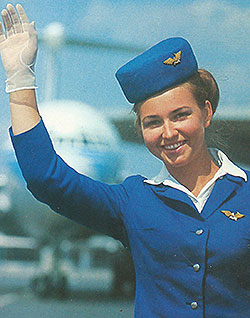In the 1960s, Aeroflot had something of a public relations problem. Although it was then the world’s largest airline — and a vital link for its vast motherland — its reputation for Soviet austerity was well-earned. On domestic routes, passengers endured indifferent service, chronically oversold flights, and uncomfortable aircraft.1 The situation was so dire that a 1960 column in Komsomolskaya Pravda, the official newspaper of the youth wing of the Communist Party, openly criticized the state-owned airline: “Unfortunately no genuine concern for passengers is felt in Aeroflot.”2
So Aeroflot did something distinctly un-Soviet: it turned increasingly to Western marketing techniques. Techniques that included a jingle sung by none other than Eduard Khil, Mr. Trololo himself.
Although advertising, according to the traditional Soviet view, was a parasitic drain on the economy, it was not unheard of in the USSR. Certain publications and broadcasters began accepting advertising as early as the 1940s.3 In the 1960s, stability and rising living standards in the USSR had fostered the development of a growing consumer culture. By the end of the decade, Aeroflot could claim to fly a quarter of the Soviet population every year — more than twice as many people as the largest U.S. carrier, United.4
Even as consumers were beginning to expect more at home, Aeroflot was increasingly looking abroad. In 1968, Aeroflot began direct flights to New York with service to an international standard aboard modern Ilyushin-62 jets; passengers aboard those early flights were impressed by the comfort of the seats, the decor of the planes, and the attractiveness of the stewardesses.5 In Western media, the airline advertised not only service to the USSR but also connections between Europe and the Far East.
Aeroflot was shifting its focus; no longer would it be merely an airborne bus service crossing 11 domestic timezones. It was becoming a true international airline.
Which is why this jingle is so fascinating. It comes from a flexidisc in a special Aeroflot issue of Krugozor magazine, a publication of the state-owned Melodiya record label. There are two songs on the disc. The first, “What Does a Pilot Need?” was sung by Eduard Khil several years before the performance that would one day make him Internet-famous:
The second, titled “Aeroflot,” is included above.6
It’s interesting to compare these songs with the advertising of contemporary Western airlines. One key difference is distribution: while American jingles were used to back broadcast advertising, these songs were instead included on a commemorative recording that was perhaps given to passengers or otherwise sent to subscribers of the Krugozor magazine.
Stylistically, “What Does a Pilot Need?” sounds more like a folk song. But “Aeroflot” would not have sounded out of place as an American jingle of perhaps ten years earlier, in the late 1950s. The talent evident on the record is impressive: Yan Frenkel and Alexander Kolker were both prominent composers, and Khil was already a famous and award-winning singer. It would have been rare for an American jingle of the time to attract that level of talent. Still, it’s the content of the songs that provides the sharpest contrast.
 Welcome aboard, comrade!
Welcome aboard, comrade!While 1960s-era Western advertising tended to focus on stewardesses, these songs are very much from the pilot’s perspective — notwithstanding the picture of the smiling stewardess waving a gloved hand on the album cover. The answer to the question in “What Does a Pilot Need?” is essentially that a pilot needs not to smash into the ground. The pilot’s happy as long as the number of landings equals the number of take-offs. But even Soviet passengers presumably expected more from the airline than a flight that doesn’t end in a fiery plane crash.
In “Aeroflot,” the airline promises to fly no matter how bad the weather or dark the night. From an airline with a reputation for cancellations and flights sometimes delayed for days, this is both reassuring and a little alarming. It sounds reckless to fly despite snow and ice. Certainly you would never hear an American airline admit that the skies can ever be anything other than blue.
Jingles can reveal much about an airline’s history and culture. These two songs were produced at a time of transition for Aeroflot. Though it suffered through some very bleak years following the collapse of the USSR, Aeroflot is now unquestionably a world-class airline with modern equipment and an excellent standard of service. After a process that really began in the 1960s, it is truly a global carrier.
(A very special thanks to my colleague Olga Vladova for the translation.)
Airline: Aeroflot Russian Airlines
Title: “Aeroflot”
Agency: Krugozor
Written by: Alexander Kolker (music), Kim Ryzhov (lyrics)
Year: 1969
Lyrics:
Hurry, we all hurry.
And what if it rains? Please don’t tell me, “the flight will be cancelled.”
We fly above clouds, we’re not afraid of bad weather. That’s our Aeroflot.
What if winter comes?
And it snows and gets icy. Please don’t tell me, “the flight will be cancelled.”
Even in winter, you should know that planes will never fail you. That’s our Aeroflot.
What if night comes and someone is waiting for us? Please don’t tell me, “the flight will be cancelled.”
Aeroflot will take you to any timezone at any time of day.
Hurry, we all hurry.
And what if it rains? Please don’t tell me, “the flight will be cancelled.”
We fly above clouds, we’re not afraid of bad weather. That’s our Aeroflot.
Airline: Aeroflot Russian Airlines
Title: “What Does a Pilot Need?”
Agency: Krugozor
Written by: Yan Frenkel (music), Igor Shaferan (lyrics)
Performed by: Eduard Khil
Year: 1969
Lyrics:
Once again pilots get ready for a flight
Sitting tightly in a circle
There is no railroad in the sky yet
That is known for certain, my friend.
What does a pilot need?
A pilot needs little, believe me, very little.
Only total order (peace and quiet).
Pilots only need the number of take-offs and landings to be the same.
Number of take-offs and number of landings.
Imagine, how is it to make this trip?
We’ve been here a thousand times.
Our life is never easy nor cloudless.
What does a pilot need?
A pilot needs little, believe me, very little.
Only total order (peace and quiet).
Pilots only need the number of take-offs and landings to be the same.
Number of take-offs and number of landings.
We’ll rest for an hour or two.
In a faraway airport.
The head pilot will check the weather.
And the plane will fly high again.
What does a pilot need?
A pilot needs little, believe me, very little.
Only total order (peace and quiet).
Pilots only need the number of take-offs and landings to be the same.
Number of take-offs and number of landings.
What does a pilot need?
A pilot needs little, believe me, very little.
Only total order (peace and quiet).
Pilots only need the number of take-offs and landings to be the same.
Number of take-offs and number of landings.
Once again pilots get ready for a flight
Sitting tightly in a circle
There is no railroad in the sky yet
That is known for certain, my friend.
What does a pilot need?
A pilot needs little, believe me, very little.
Only total order (peace and quiet).
Pilots only need the number of take-offs and landings to be the same.
Number of take-offs and number of landings.
- “Flying in Soviet Can Be a Picnic,” The New York Times (6 August 1967). [↩]
- “Poor Air Service Scored in Soviet,” The New York Times (17 October 1960): 53. [↩]
- James Markham, “Is Advertising Important in the Soviet Economy?” Journal of Marketing 28 (1964): 31. [↩]
- R.E.G. Davies, Airlines of the Jet Age (Washington: Smithsonian Institution Scholarly Press, 2011): 428. [↩]
- P.J.C.F., “A Fast Flight on Aeroflot’s New Jet,” The New York Times (21 July 1968), XX5. In the 60s, rating the attractiveness of the stewardesses was a standard part of an airline review. [↩]
- Unfortunately, it’s a little cut off because my copy of the disc is damaged. This recording is missing about 8 seconds of non-lexical vocables at the end. [↩]
